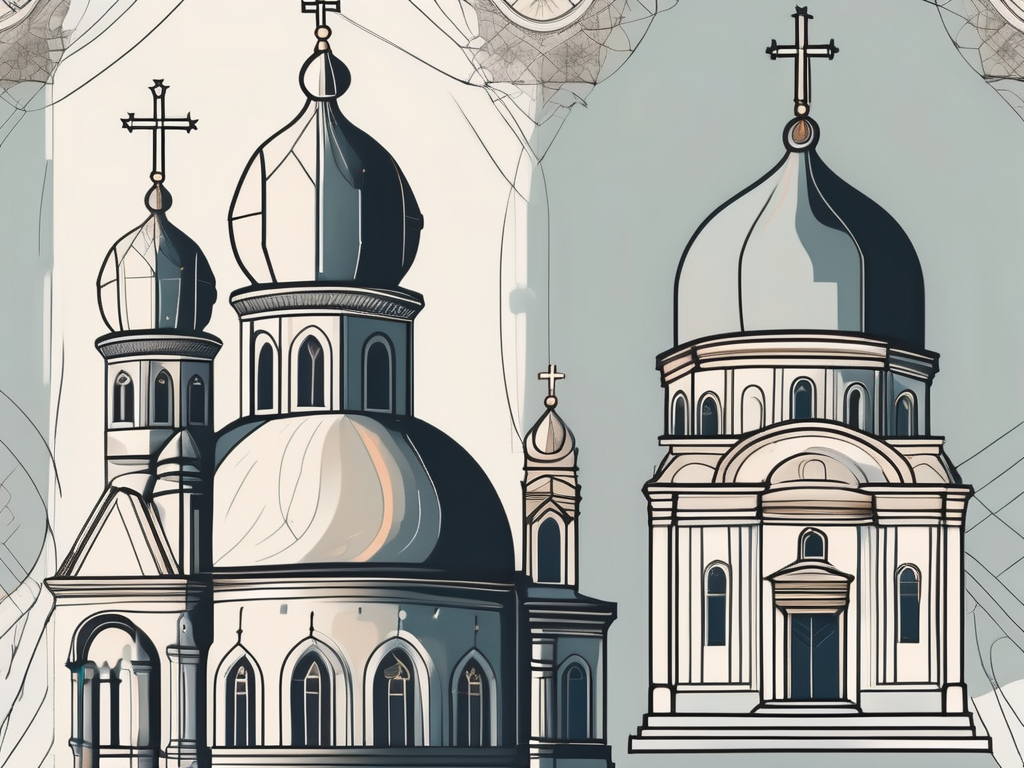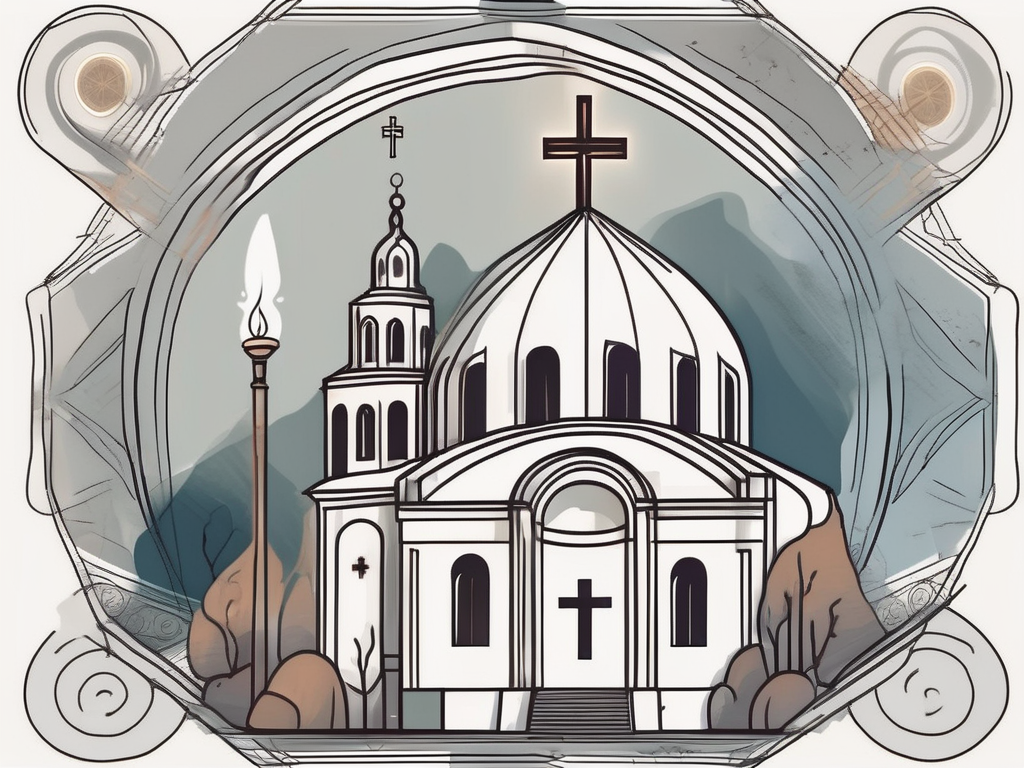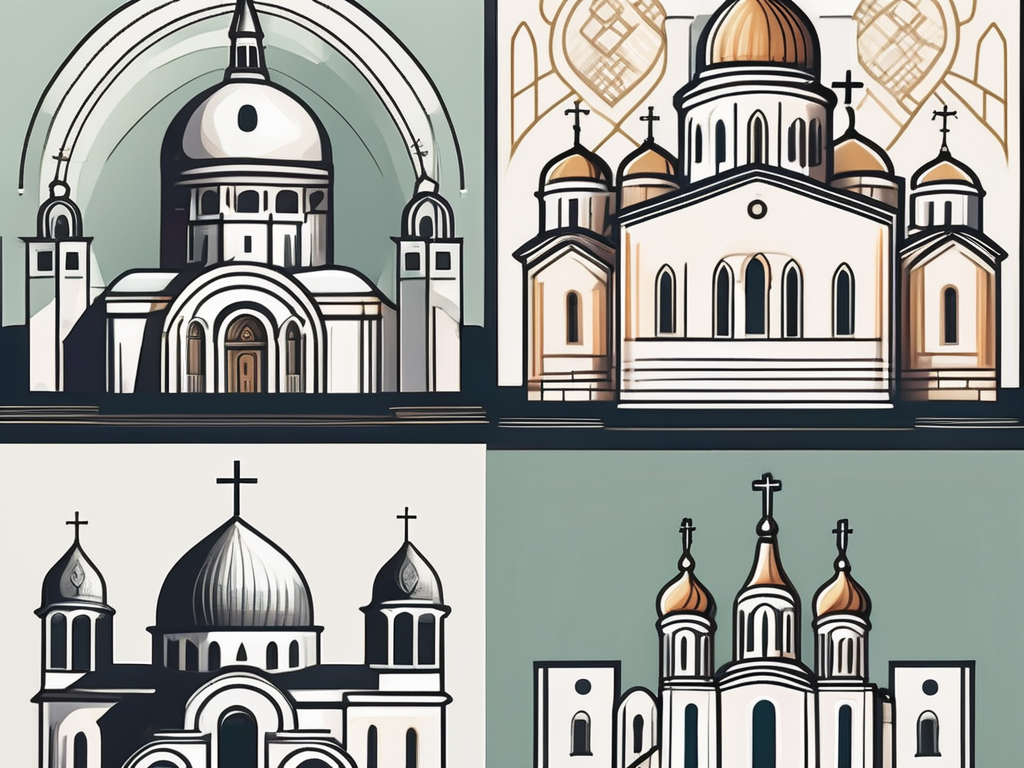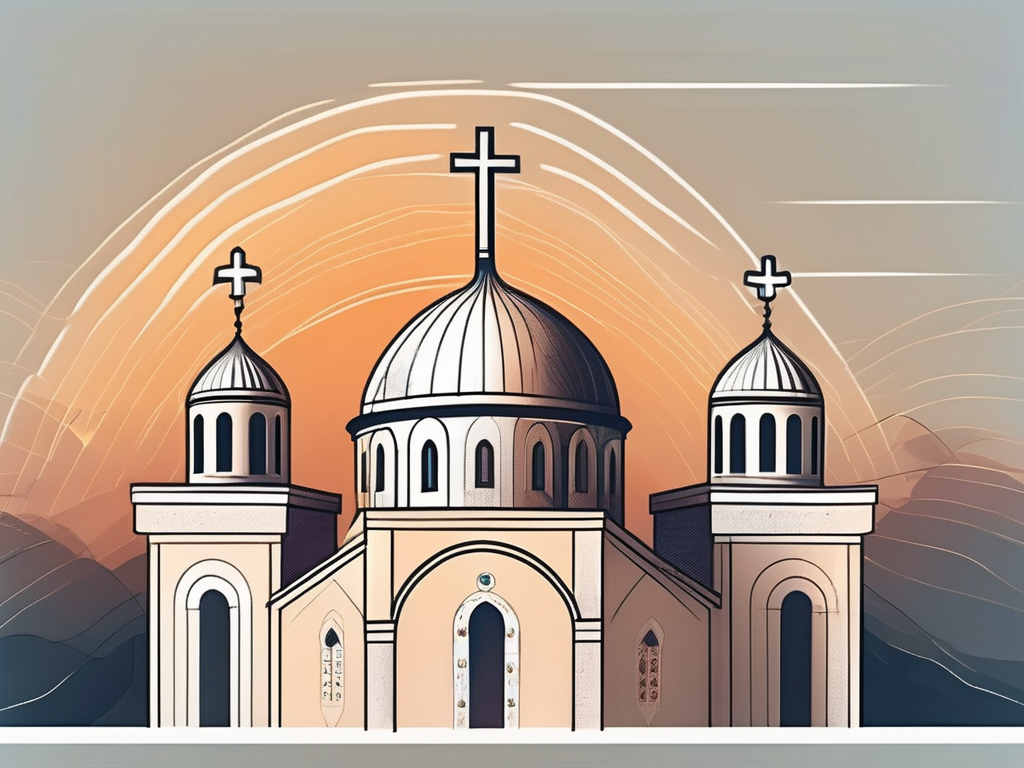Orthodox Christianity can be quite intriguing to a newcomer. With its rich history, diverse traditions, and strong sense of community, it is a religious faith that boasts a unique tapestry of beliefs and practices. In this comprehensive overview, we will delve into the origins, key beliefs, structure, and rituals of Orthodox Christianity. We will also explore its global reach, theological differences with other Christian denominations, and the challenges and opportunities that lie ahead. So, let’s begin our journey of understanding this ancient and vibrant faith.
Understanding Orthodox Christianity
The Origins and History of Orthodox Christianity
Orthodox Christianity traces its roots back to the early days of Christianity. The followers of Jesus Christ, known as apostles, spread the teachings of Christ throughout the Mediterranean region. They faced persecution and challenges as they sought to establish a community of believers.
In the 4th century, the Roman Emperor Constantine issued the Edict of Milan, granting Christianity legal status and paving the way for the Council of Nicaea in 325 AD. This council was a significant moment in the history of Orthodox Christianity, as it brought together bishops from across the empire to discuss and define key theological concepts.
It was at the Council of Nicaea that the foundations of Orthodox Christian beliefs were solidified. The council addressed important issues such as the nature of Christ, the Trinity, and the role of the Church. These discussions and decisions shaped the theological framework of Orthodox Christianity for centuries to come.
The Great Schism of 1054 between the Eastern Orthodox Church and the Roman Catholic Church further shaped the identity of Orthodox Christianity. While sharing a common history until that point, theological and administrative differences led to the split. This division had profound implications for both churches and resulted in distinct practices, traditions, and beliefs.
Today, Orthodox Christianity is predominantly practiced in Eastern Europe, Russia, and the Middle East, but its influence extends far beyond those regions. Orthodox communities can be found in various parts of the world, carrying on the rich heritage and traditions of this ancient faith.
Key Beliefs and Practices in Orthodox Christianity
The heart of Orthodox Christianity lies in its unwavering commitment to the teachings of Jesus Christ and the preservation of apostolic tradition. Orthodoxy holds steadfast to the belief that the Bible is a divinely inspired text and that the Church provides the authoritative interpretation of its teachings.
Central to Orthodox worship is the Divine Liturgy, a solemn and reverent ritual that symbolizes the Last Supper. This celebration of the Eucharist is considered the most important sacrament in Orthodoxy, where believers partake of the Body and Blood of Christ. The Divine Liturgy is a deeply spiritual experience, filled with prayers, hymns, and rituals that connect the worshipper to the divine presence.
Orthodox Christians also place great importance on prayer, fasting, and almsgiving as acts of devotion and spiritual discipline. These practices are seen as ways to draw closer to God and cultivate a life of humility, self-control, and compassion.
The veneration of icons is another distinctive feature of Orthodox Christianity. Icons are considered windows to the divine and are used as aids in prayer and meditation. They depict Christ, the Virgin Mary, saints, and biblical scenes, serving as visual reminders of the spiritual reality and the communion of saints.
The Structure and Organization of the Orthodox Church
The Orthodox Church is structured hierarchically, with the Patriarch or Metropolitan serving as the highest-ranking bishop within a specific region. Beneath the Patriarch are bishops, priests, and deacons who serve their respective communities. Each local church is autonomous but maintains a strong connection to the wider Orthodox communion.
Moreover, the Orthodox Church places great emphasis on unity, preserving the faith and tradition through regular gatherings. The major councils of the Orthodox Church, such as the Ecumenical Councils, bring together bishops from around the world to discuss theological matters and shape the direction of the Church. These councils have been instrumental in resolving disputes, clarifying doctrine, and maintaining the unity of Orthodox Christianity.
Orthodox Christianity also values the monastic tradition, with monasteries serving as centers of prayer, study, and spiritual guidance. Monks and nuns dedicate their lives to a disciplined and contemplative existence, seeking to deepen their relationship with God and intercede for the world.
Overall, Orthodox Christianity is a rich and vibrant faith with a deep sense of history, tradition, and spirituality. Its theological depth, liturgical beauty, and commitment to apostolic tradition continue to inspire and guide millions of believers around the world.
The Role of Rituals and Traditions in Orthodox Christianity
Orthodox Christianity is a faith rich in rituals and traditions that serve to deepen the spiritual connection between believers and God. These practices not only provide a sense of continuity with the early Christian Church but also offer a tangible way to experience the divine presence. Among the many rituals and traditions in Orthodox Christianity, the Divine Liturgy, the sacraments, and the observance of fasting and feasts hold significant importance.
The Significance of the Divine Liturgy
The Divine Liturgy, also known as the Holy Eucharist, stands as the centerpiece of Orthodox worship. It is a sacred and awe-inspiring ritual that takes place in ornate churches, filled with the scent of incense, icons adorning the walls, and candlelit prayers. The liturgy combines scripture readings, prayers, hymns, and the consecration of the bread and wine into the Body and Blood of Christ.
During the Divine Liturgy, the faithful experience a mystical connection with the divine. The prayers and hymns sung by the congregation create a harmonious atmosphere, lifting their spirits and guiding them towards a deeper understanding of their faith. The consecration of the bread and wine represents the transformation of these elements into the actual presence of Christ, allowing the believers to partake in His divine nature.
Through the Divine Liturgy, Orthodox Christians not only commune with God but also strengthen their bond with the larger Orthodox community. The shared experience of worship, the exchange of greetings and blessings, and the act of receiving the Eucharist together foster a sense of unity and belonging.
The Sacraments in Orthodox Christianity
In addition to the Eucharist, Orthodox Christianity recognizes several other sacraments that mark significant milestones in a believer’s life. These sacraments include baptism, chrismation, marriage, ordination, confession, and anointing of the sick.
Baptism is the sacrament of initiation, through which an individual is cleansed of original sin and becomes a member of the Church. Chrismation, often performed immediately after baptism, involves anointing with holy oil and the receiving of the Holy Spirit. Marriage is seen as a sacrament that unites a man and a woman in a lifelong commitment, blessed by God. Ordination is the sacrament through which individuals are consecrated as clergy, serving the Church and its members. Confession allows believers to seek forgiveness for their sins and receive spiritual guidance from a priest. Anointing of the sick is a sacrament that offers comfort and healing to those who are ill or facing serious health challenges.
Each of these sacraments holds deep religious and spiritual significance in Orthodox Christianity. They serve as transformative moments in a believer’s life, strengthening their relationship with God and their connection to the Orthodox community.
Fasting and Feasts: The Orthodox Calendar
The Orthodox Church follows a liturgical calendar that is replete with feasts, fasts, and commemorations. Fasting plays a prominent role in Orthodoxy, with strict guidelines observed during periods such as Great Lent and Advent.
Great Lent, the forty-day period leading up to Easter, is a time of intense fasting and prayer. Believers abstain from certain foods, engage in acts of charity, and increase their attendance at church services. This period of self-discipline and reflection allows Orthodox Christians to prepare themselves spiritually for the celebration of Christ’s resurrection.
Advent, the period leading up to Christmas, is another time of fasting and anticipation. It is a season of waiting and preparing for the birth of Christ, with believers focusing on prayer, repentance, and acts of kindness.
These fasts aim to purify both the body and the soul, reflecting on the sacrifice of Jesus Christ and His journey towards crucifixion and resurrection. By abstaining from certain foods and engaging in acts of self-denial, believers seek to detach themselves from worldly distractions and focus on their spiritual growth.
Feasts, on the other hand, are joyous celebrations that honor various saints, events in the life of Christ, and important moments in Christian history. Orthodox Christians come together to share in the holy festivities, offering prayers, partaking in fellowship, and enjoying traditional dishes that have been passed down through generations.
These feasts serve as reminders of the rich history and traditions of the Orthodox faith. They provide an opportunity for believers to express their gratitude and joy, as well as to deepen their understanding of the saints and events being commemorated.
In conclusion, rituals and traditions play a vital role in Orthodox Christianity, providing believers with a tangible way to experience the divine and strengthen their spiritual connection. The Divine Liturgy, the sacraments, fasting, and feasts all contribute to the richness and depth of the Orthodox faith, fostering a sense of unity, reverence, and joy within the Orthodox community.
Orthodox Christianity Around the World
The Spread and Influence of Orthodox Christianity
From its humble beginnings in the heart of the Roman Empire, Orthodox Christianity has spread to become a global faith with a significant presence in various regions. Eastern Europe, including countries like Russia, Greece, Serbia, and Ukraine, is home to the largest Orthodox populations. The history of Orthodox Christianity in these regions is rich and diverse, with each country having its own unique traditions and practices.
In Russia, for example, Orthodoxy has been deeply intertwined with the country’s history and culture for centuries. The Russian Orthodox Church played a crucial role in shaping the identity of the Russian people, serving as a unifying force during times of political and social upheaval. The iconic onion-domed churches that dot the Russian landscape are a testament to the enduring influence of Orthodoxy in the country.
In Greece, Orthodoxy is not only a religious institution but also a cultural cornerstone. Greek Orthodox traditions and customs are deeply ingrained in the daily lives of the Greek people. From the celebration of Easter with elaborate processions and feasts to the reverence for saints and icons, Orthodoxy is an integral part of Greek identity.
While Eastern Europe may be the heartland of Orthodox Christianity, the faith has also found a home in other parts of the world. In North America, for instance, Orthodox communities have thrived and grown over the years. Immigrants from Eastern Europe brought their faith with them, establishing churches and preserving their religious traditions in a new land. Today, Orthodox Christianity in North America is a vibrant and diverse community, with people from various ethnic backgrounds coming together to worship and practice their faith.
Orthodox Christianity has also made significant inroads in Africa, particularly in countries like Ethiopia and Egypt. In Ethiopia, the Ethiopian Orthodox Tewahedo Church is one of the oldest Christian communities in the world, dating back to the 4th century. The vibrant spiritual practices and unique liturgical traditions of the Ethiopian Orthodox Church have captivated the hearts of millions.
Furthermore, Orthodox Christianity has reached South America, where it has found a home among immigrant communities from Eastern Europe and the Middle East. In countries like Brazil and Argentina, Orthodox churches stand as a testament to the enduring faith of these communities, preserving their religious heritage while also adapting to the local culture.
Orthodox Christianity in Modern Society
In the modern world, Orthodox Christianity faces the challenge of adapting and maintaining its rich traditions while engaging with contemporary society. The Orthodox Church continues to play an influential role in matters of ethics, social justice, and interfaith dialogue. It seeks to bridge the gap between traditional values and the rapidly changing world, embracing the potential for growth and renewal while safeguarding its ancient teachings.
One of the ways in which Orthodox Christianity engages with modern society is through its commitment to social justice. The church actively participates in charitable initiatives, providing support to the less fortunate and advocating for the rights of marginalized communities. Orthodox Christian organizations around the world work tirelessly to alleviate poverty, promote education, and address social inequalities.
Interfaith dialogue is another important aspect of Orthodox Christianity in the modern world. The Orthodox Church recognizes the need for peaceful coexistence and mutual understanding among different religious communities. Through dialogue and cooperation, the church seeks to foster harmony and build bridges between people of different faiths, promoting a spirit of tolerance and respect.
While Orthodox Christianity holds steadfast to its ancient traditions, it also recognizes the need to engage with contemporary issues and adapt to the changing times. The church embraces technology and social media as tools for spreading its message and connecting with believers across the globe. Online platforms provide a space for theological discussions, spiritual guidance, and the sharing of religious resources.
In conclusion, Orthodox Christianity has transcended its origins in the Roman Empire to become a global faith with a rich and diverse presence around the world. From Eastern Europe to North America, Africa to South America, Orthodox communities thrive, enriching local cultures and engaging with the challenges of the modern world. As the church continues to evolve and adapt, it remains steadfast in its commitment to preserving its ancient traditions while actively participating in the social, cultural, and spiritual fabric of society.
Theological Differences: Orthodox Christianity and Other Christian Denominations
Orthodox Christianity vs. Roman Catholicism
Despite sharing a common history, Orthodox Christianity and Roman Catholicism diverged over time due to different interpretations of faith and administration. Orthodox Christians emphasize the communal aspect of their faith and the authority of the local church, while Roman Catholics emphasize the authority of the Pope and the unity of the church under his leadership.
Orthodox Christianity vs. Protestantism
The theological differences between Orthodox Christianity and Protestantism primarily stem from the Protestant Reformation, which challenged the authority and practices of the Roman Catholic Church. Orthodox Christians hold to a more sacramental understanding of salvation and place a greater emphasis on tradition, while Protestantism places a strong focus on personal faith and a direct relationship with God.
The Future of Orthodox Christianity
Challenges and Opportunities for Orthodox Christianity
As with any religious tradition, Orthodox Christianity faces both challenges and opportunities in the modern world. Globalization, secularism, and changing societal norms present obstacles for the Church to navigate. However, these challenges also provide opportunities for Orthodox Christianity to engage in dialogue, embrace inclusivity, and find new ways to connect with the younger generations.
The Role of Orthodox Christianity in Interfaith Dialogue
Orthodox Christianity has an important role to play in interfaith dialogue, fostering mutual understanding and respect among different religious traditions. Through open and respectful conversations, the Orthodox Church can contribute to global peace and harmony, recognizing shared values and promoting cooperation for the betterment of humanity.
In conclusion, Orthodox Christianity is a faith that has withstood the test of time, rooted in a rich history and vibrant traditions. From its origins in the early days of Christianity to its global reach today, Orthodox Christianity continues to be a source of spiritual guidance and communal strength for millions around the world. As it faces the challenges and opportunities of the modern age, Orthodox Christianity remains steadfast, evolving while remaining true to its ancient and treasured beliefs.












